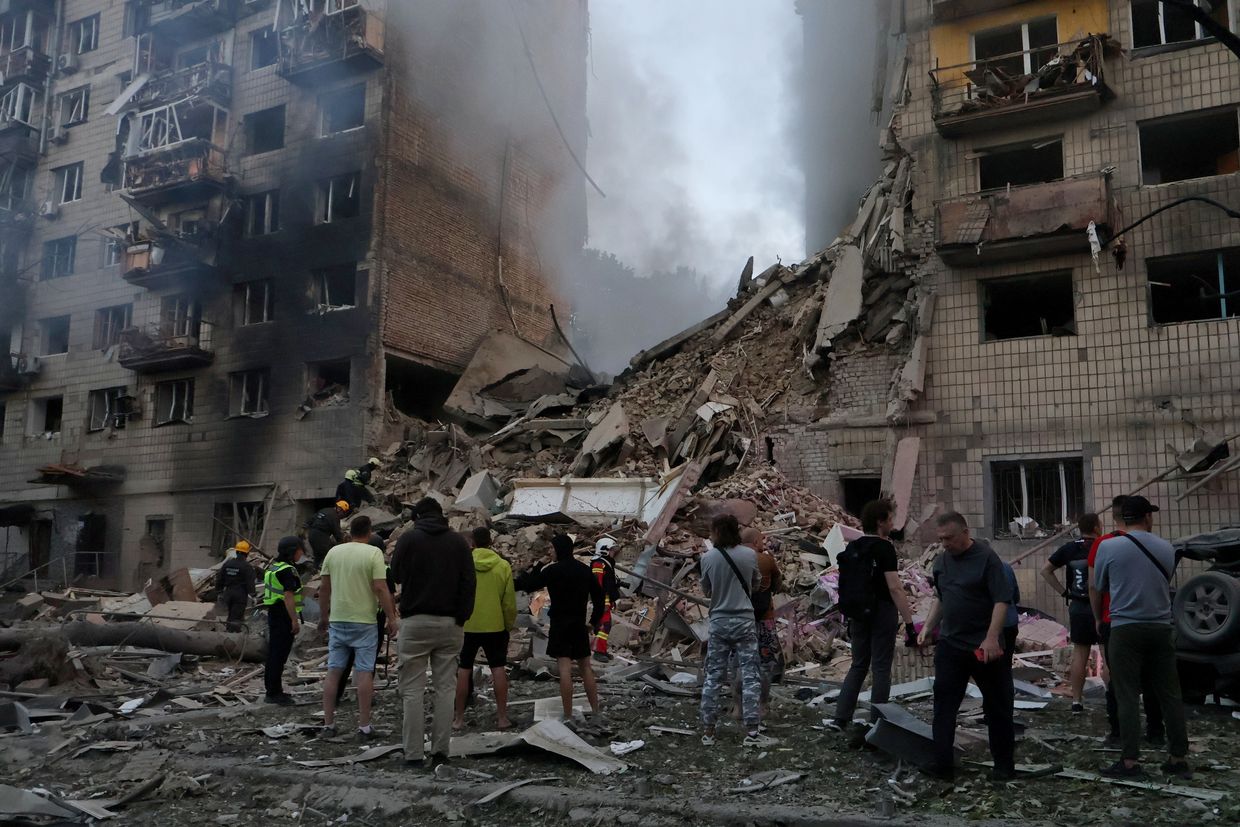Florida Says Ban on Openly Carrying Guns Is Invalid After Court Ruling

© Shannon Stapleton/Reuters


© Shannon Stapleton/Reuters


© Pool photo by Ben Stansall


© Stephanie Lecocq/Reuters


© Stephane Mahe/Reuters


© Pool photo by Benoit Tessier


© Ludovic Marin/Agence France-Presse — Getty Images


© Ludovic Marin/Agence France-Presse — Getty Images


© Stephane De Sakutin/Agence France-Presse — Getty Images


© David Guttenfelder/The New York Times


© Marco Bello/Reuters
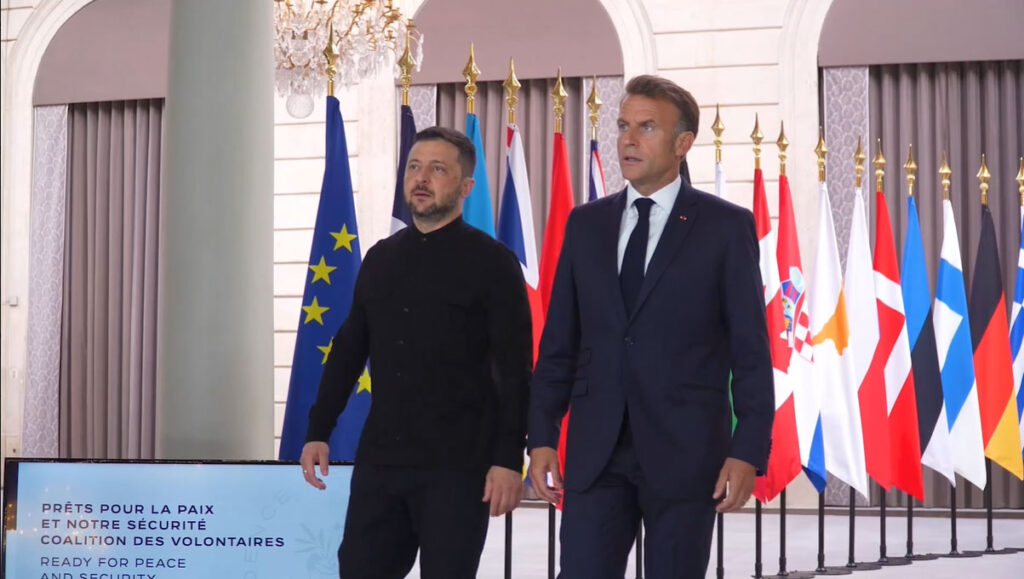

Ukraine’s allies met in Paris to discuss security guarantees, but doubts grew as US commitments remained unclear. Reuters reports the summit brought together 30 leaders seeking to reassure Kyiv while peace talks with Russia look increasingly remote.
On 4 September 2025, Ukrainian President Volodymyr Zelenskyy joined about 30 Western leaders in Paris for talks on security guarantees. The “coalition of the willing” includes European states, Canada, Japan, and Australia. Some leaders attended in person, while others joined by video-link.
The summit aimed to define military support for Ukraine in the event of a truce with Russia. But months of discussion have produced no clarity, as governments argue that European commitments need a US backstop.
Reuters noted that US President Donald Trump has yet to make any explicit pledge. His envoy Steve Witkoff met senior European officials in Paris hours before the meeting, according to diplomats. French President Emmanuel Macron said on 3 September alongside Zelenskyy that coalition leaders would endorse security plans drawn up by their militaries. Macron said Ukraine’s allies have finalized and are ready to politically approve military security guarantees to support Kyiv once a peace deal is reached, according to dpa.
Two European officials confirmed to Reuters the technical plans were finished, though they gave no details.
British and French army chiefs briefed the leaders during the talks. Macron told reporters, “We are ready, us Europeans, to provide security guarantees to Ukraine for when there is a signed peace,” while stressing that sincerity from Russia remains in question.
European officials said the goal was to send a political signal to Trump. Leaders hoped to highlight the absence of progress toward peace talks between Russian President Vladimir Putin and Zelenskyy since Trump hosted Putin in August.
Trump, after hosting Putin, accused him of conspiring with China and North Korea. On 3 September, he denounced the three leaders’ show of unity in Beijing during a commemoration of the end of World War Two.
NATO Secretary General Mark Rutte said on 3 September he expected clarity soon from the coalition on what could be delivered, and that this would pave the way for deeper discussions with Washington.
Western officials said the central element of guarantees would be continued support for Ukraine’s armed forces. Proposals also included deploying an international force in Ukraine or nearby countries to reassure Kyiv, despite Russia’s opposition to foreign troops.
European leaders insisted such a force could only happen with US backing. Trump has spoken in broad terms about supporting Ukraine but has not specified what Washington would contribute, Reuters says. The French presidency said some leaders would call Trump after the summit.


© Sarah Meyssonnier/Reuters


© Graham Dickie/The New York Times


© Chris O'Meara/Associated Press


© Chris O'Meara/Associated Press
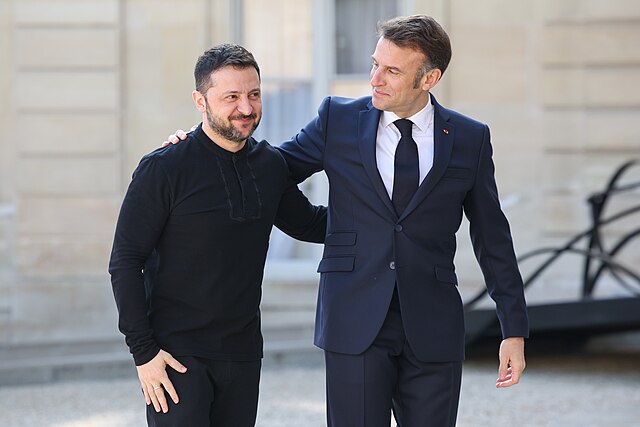

French President Emmanuel Macron is set to meet Ukrainian President Volodymyr Zelenskyy in Paris on the evening of 3 September, a day before the “Coalition of the Willing” summit scheduled for 4 September, according to an undisclosed source at the Élysée Palace cited by European Pravda.
The meeting comes as Ukraine continues to press for security guarantees from Western allies amid efforts towards a ceasefire with Russia.
The Paris summit will bring together countries ready to provide security guarantees to Ukraine if a ceasefire is reached, with the aim of coordinating technical and strategic measures to strengthen Ukraine’s defense and support the enforcement of peace efforts.
A French official told European Pravda that the talks aim to convey that the countries ready and able to provide security guarantees have completed their planning. They said that chiefs of staff and defense ministers have already completed the necessary groundwork.
“Today we are ready to provide these security guarantees,” the official said, adding that the effort also includes support for applying pressure on Russia to achieve a ceasefire.
The “Coalition of the Willing” summit will take place in a hybrid format under the joint leadership of Macron and UK Prime Minister Keir Starmer. Ukrainian President Zelenskyy is expected to join.
Discussions are likely to cover potential deployment of peacekeeping forces, as highlighted recently by Lithuanian President Gitanas Nausėda.
This meeting follows earlier efforts by Ukraine to secure Western security guarantees. Western nations are continuing to develop frameworks for post-ceasefire security in Ukraine, but many believe that a ceasefire remains unlikely in the near term.
The upcoming Paris talks are seen as a continuation of these efforts, providing Ukraine with a platform to push for concrete commitments on security guarantees and measures to strengthen pressure on Russia.


In a report on 31 August, the Institute for the Study of War (ISW) outlined how the Kremlin has intensified its multi-pronged information campaign to weaken Western support for Ukraine and derail the European role in peace efforts in the ongoing Russo-Ukrainian war.
Russia is now aggressively pushing three narrative lines at once: blaming European states for prolonging the war, reviving nuclear threats, and portraying Russian victory as inevitable.
Kremlin officials have returned to a long-standing propaganda line that paints European states as obstacles to peace in Ukraine. ISW noted that Kremlin spokesperson Dmitry Peskov and Russian Direct Investment Fund (RDIF) CEO Kirill Dmitriev recently implied that European countries are deliberately extending the conflict. According to ISW, Russia is using Dmitriev—who frequently represents Kremlin interests on Western platforms—to reintroduce this message into the Western media environment, aiming to erode US confidence in European allies.
On 31 August, Russian Security Council Chairperson Dmitry Medvedev launched a pointed attack against French President Emmanuel Macron and German Chancellor Friedrich Merz. Posting on his English-language X account, Medvedev accused the two leaders of having “forgotten the lessons” of World War II. He warned that “things could end up like they did in 1945 – [Macron and Merz] too may end up being identified by their teeth,” directly invoking the atomic bombings of Hiroshima and Nagasaki. Medvedev also described recent Russian military progress as “bad news” for the European leaders.
ISW assessed that this language is intended to threaten France and Germany with nuclear consequences for their involvement in US-led efforts to end the war, while simultaneously amplifying the idea of unstoppable Russian military momentum.
Alongside these threats, the Kremlin continues to push the idea that Russian victory in Ukraine is certain. ISW reported that the Russian Ministry of Defense has ramped up its efforts to project battlefield success using large volumes of qualitative data. However, ISW assessed that these claims are inflated and part of the broader strategy to demoralize Ukraine’s allies and reduce Western resolve.
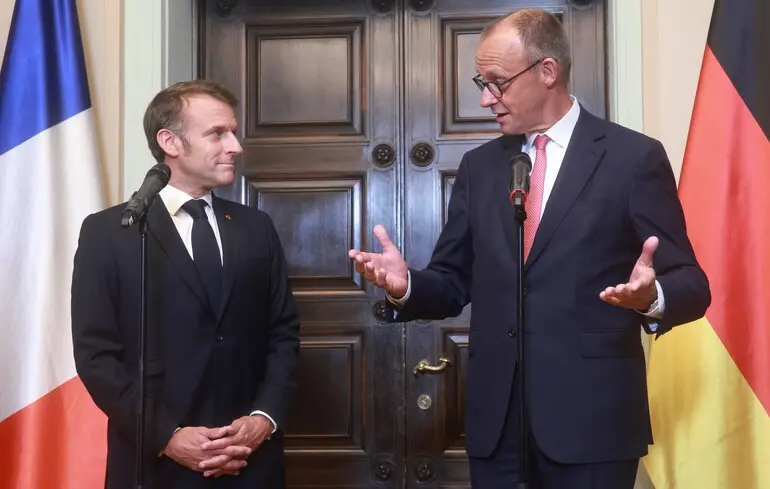

German Chancellor Friedrich Merz and French President Emmanuel Macron announced plans for secondary sanctions targeting companies from third countries that support Russia’s war effort, as European leaders grow impatient with the stalled peace negotiations.
The initiative emerged from a meeting of German and French cabinet members on 29 August, according to Bloomberg. Both leaders called for measures to undermine Russia’s ability to finance its military operations through oil sales.
“We will continue to exert pressure for additional sanctions to be imposed by ourselves — and we are prepared to do so — but also by the US, to force Russia to return to the negotiating table,” Macron said at a joint press conference with Merz at Fort du Cap Brun near Toulon.
The timing reflects mounting frustration with President Donald Trump’s approach to ending the war. Trump’s latest two-week deadline for progress is close to expiring with little visible advancement toward a peace deal. Instead, the Kremlin launched one of its heaviest drone and missile assaults of the year this week, hitting apartment buildings and killing at least four children.
Merz specifically referenced potential US tariffs as a model for action. “In America, right now they’re discussing further tariffs,” he said. “I would welcome it very much if the American government could make a decision on enforcing those on other nations whose purchases of oil and gas finance a large part of Russia’s war economy.”
The Franco-German statement outlined plans to “further extend and develop effective and robust sanctions” through cooperation within the European Union and with Group of Seven partners. The stated goal is to “exert maximum pressure on Russia.”
The EU has already begun preparing secondary sanctions aimed at Russia’s energy sector. These measures target third countries that help the Kremlin circumvent existing penalties, with additional steps planned for Russia’s oil, gas, and financial sectors.
“We are working on the next package, there are several options on the table,” EU foreign policy chief Kaja Kallas said. “Of course, what will hurt them the most is any sanctions on energy and secondary sanctions.”
The EU adopted an anti-circumvention tool in 2023 that prohibits exports, supply, or transfers of certain goods to third countries considered to aid sanctions evasion. However, the bloc has not yet deployed this instrument.
The EU has avoided secondary sanctions, particularly given recent criticism from the Trump administration about such policies. The current push suggests European leaders believe they have reached the limits of direct sanctions against Russia.
Merz has become increasingly vocal about the lack of diplomatic progress. The German leader said on 28 Augusthe no longer expects a meeting between Putin and Ukrainian President Volodymyr Zelenskyy, despite Trump’s previous suggestions that such talks were possible.
Beyond sanctions, France and Germany agreed to provide Ukraine with “credible security guarantees” that would allow the country to maintain a military “without any limitations” to deter Russia. They also committed to closer defense cooperation and standardizing military equipment between their nations.
The two countries plan to discuss including France’s nuclear weapons in Europe’s overall security architecture, though they postponed a final decision on the troubled FCAS fighter-jet project until year-end.
Kallas indicated broad support among EU defense ministers for expanding the mandate of EU training missions after a ceasefire, allowing training to occur inside Ukraine rather than just outside its borders.
Zelenskyy said he and European leaders will “connect” with Trump next week to discuss security guarantees during meetings where he seeks legally binding commitments from allies as part of peace negotiations.
Macron and Merz plan separate calls with Trump over the weekend, according to Bloomberg.


© Dave Sanders for The New York Times
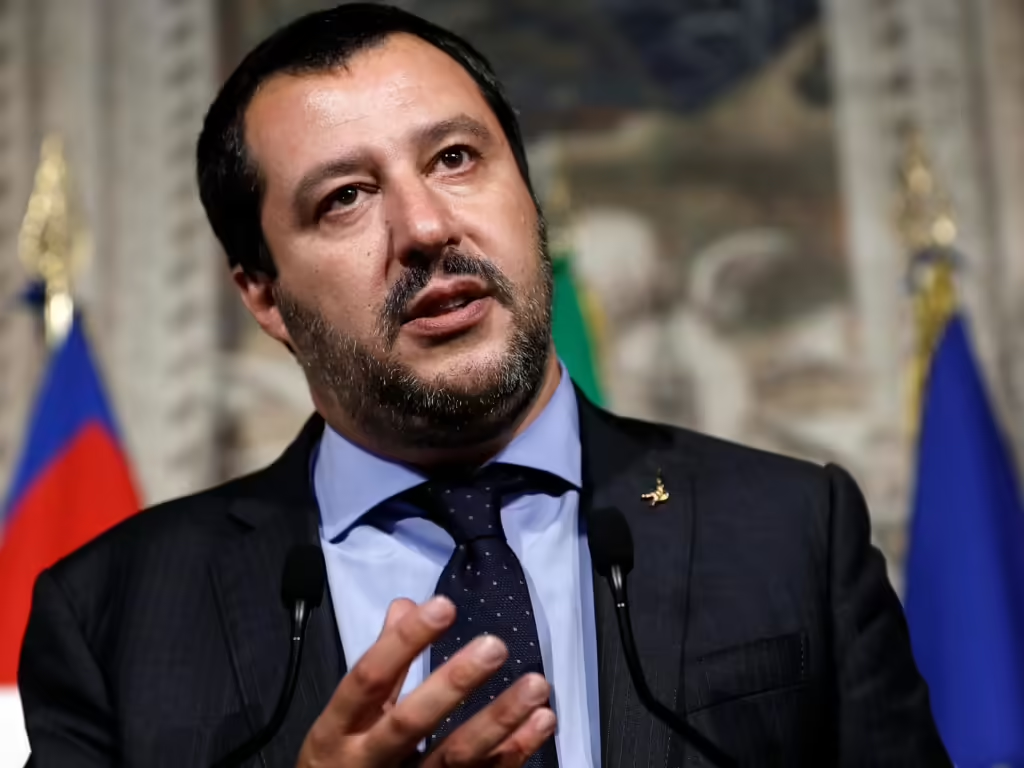

Italy’s ambassador to France, Emanuela D’Alessandro, was summoned to the French Foreign Ministry on 21 August, following what Paris deemed “unacceptable” remarks by Italian Deputy Prime Minister Matteo Salvini toward Emmanuel Macron, France Inter and Radio France’s international desk reported on 22 August.
During a speech on 20 August, Salvini criticized the French president over his support for the idea of sending troops to Ukraine.
“Italian soldiers in Ukraine? Absolutely not. If Emmanuel Macron wants it, let him go himself. Put on a helmet, take a rifle and go to Ukraine yourself,” the Italian vice-premier said.
According to a diplomatic source contacted by France Inter, during the ambassador’s summoning to the Quai d’Orsay, “she was reminded that these remarks went against the climate of confidence and the historical relationship between our two countries.” The source said these statements undermine “recent bilateral developments, which have highlighted strong convergences between the two countries, particularly regarding unwavering support for Ukraine.”
Neither Italian diplomacy nor the services of Italy’s Prime Minister Giorgia Meloni wished to comment when contacted by Radio France’s international desk on 22 August.
This marks the second time Salvini, who maintains close ties with Marine Le Pen, has verbally attacked Macron over Ukraine support. On 7 March 2025, during a trip to Milan, he called the French president “crazy,” accusing him of pushing Europe toward war with Russia.
The diplomatic incident occurs amid broader discussions about security guarantees for Ukraine. US Special Representative Steve Witkoff said that during a meeting in Alaska, Russian leader Vladimir Putin and Donald Trump agreed on “reliable security guarantees” for Ukraine, including protection analogous to NATO’s Article 5.
Following these developments, a “coalition of the willing” has expressed readiness to play a role in providing security guarantees for Ukraine by deploying military contingents on its territory. However, the nature of US support remains unclear. The White House has said Washington “can certainly help coordinate and possibly provide other means of security guarantees.”
Trump emphasized that the US would not send its military personnel but did not rule out assistance with “air transport” for allies. The Wall Street Journal reported that US Secretary of State Marco Rubio will head a working group of national security advisors and NATO representatives to develop a security guarantee project for Ukraine.
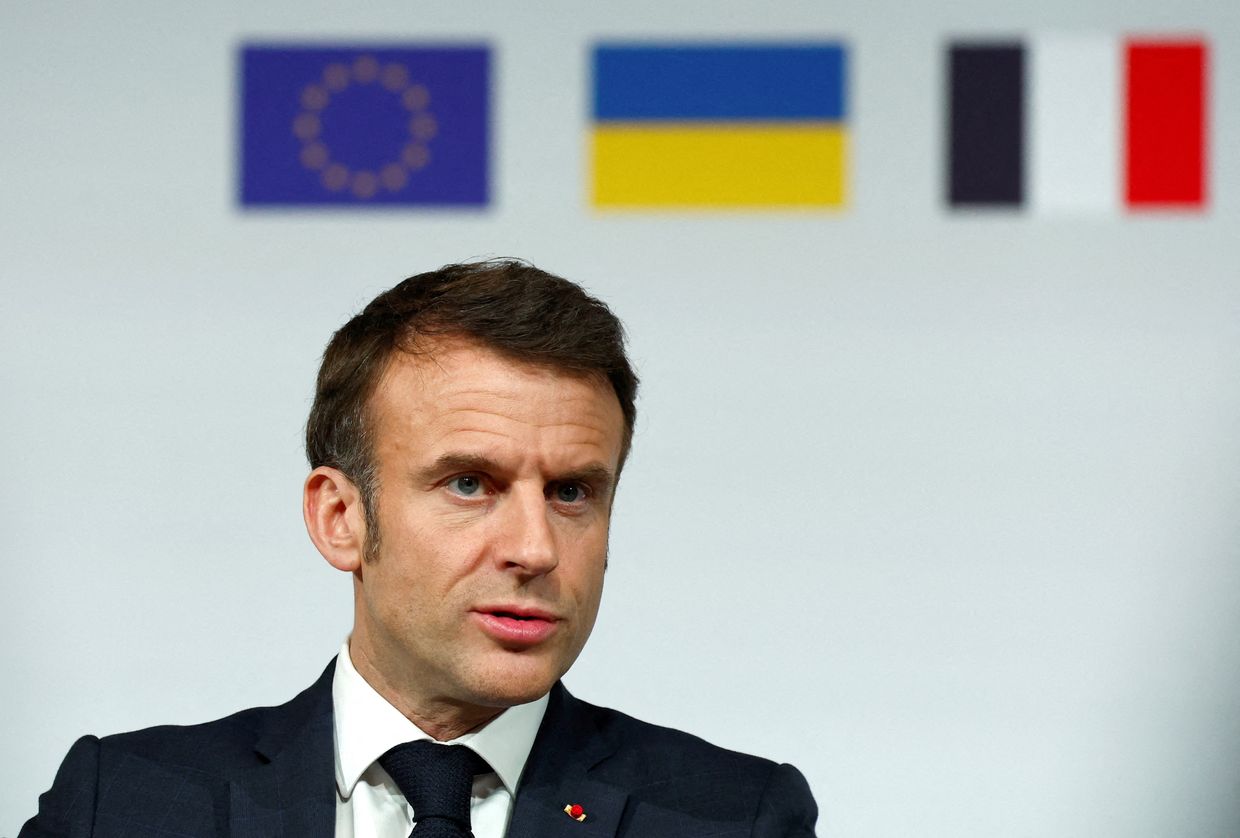

Editor's note: The story was updated as the President's Office confirmed that following the call with Vladimir Putin, Emmanuel Macron also called Volodymyr Zelensky.
French President Emmanuel Macron and his Russian counterpart Vladimir Putin held a call on July 1 for the first time since 2022, discussing Russia's war against Ukraine and the conflict in the Middle East, the Kremlin's press service reported.
The conversation between the two leaders took place as the Russian army continues to advance along the front line, trying to gain a foothold in Sumy Oblast and enter Dnipropetrovsk Oblast.
Moscow has repeatedly rejected the U.S.-backed ceasefire proposal, stalling peace talks with Ukraine.
Following the call with Putin, Macron also called Zelensky to discuss his conversation with the Russian president, a source in the President's Office told the Kyiv Independent.
The call between Zelensky and Macron was "constructive," the source added. Putin's position remained unchanged: he does not show any willingness to end the war in Ukraine, according to the source.
The call between Putin and Macron lasted over two hours, BFM TV reported, citing the Elysee Palace.
During the conversation with Macron, Putin called Russian war "a direct consequence of the policy of Western powers" that "ignored Russia's security interests, created an anti-Russian bridgehead in Ukraine," the Kremlin said.
Macron, in turn, noted France's unwavering support for Ukraine's sovereignty and territorial integrity, Suspilne reported, citing the Elysee Palace.
The French president also called for "a ceasefire to be established as soon as possible and for negotiations to begin."
The leaders will continue to discuss Russia's war in Ukraine, according to the Elysee Palace.
The presidents also discussed the situation in the Middle East regarding the Iranian-Israeli conflict and the U.S. strikes on Iranian nuclear facilities.
Macron frequently called Putin in the first year of Russia's full-scale invasion of Ukraine. Their previous call took place in September 2022.
 The Kyiv IndependentOleg Sukhov
The Kyiv IndependentOleg Sukhov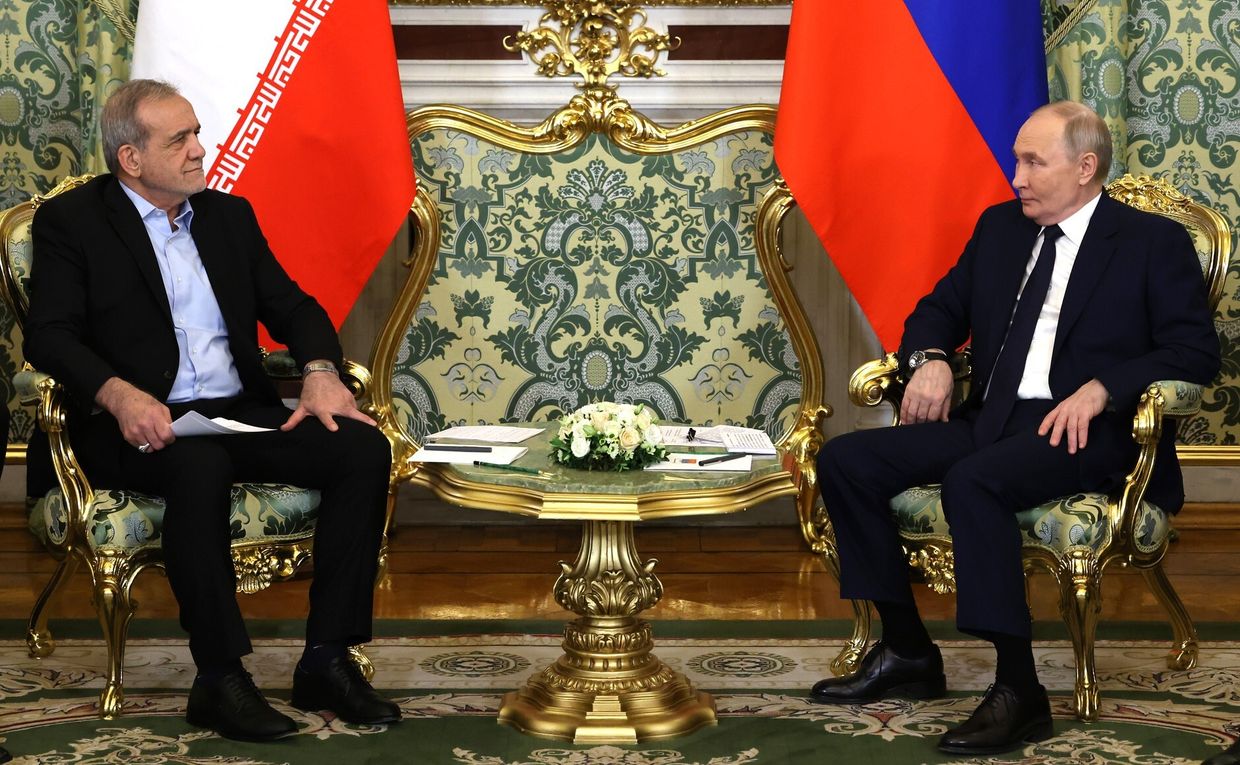
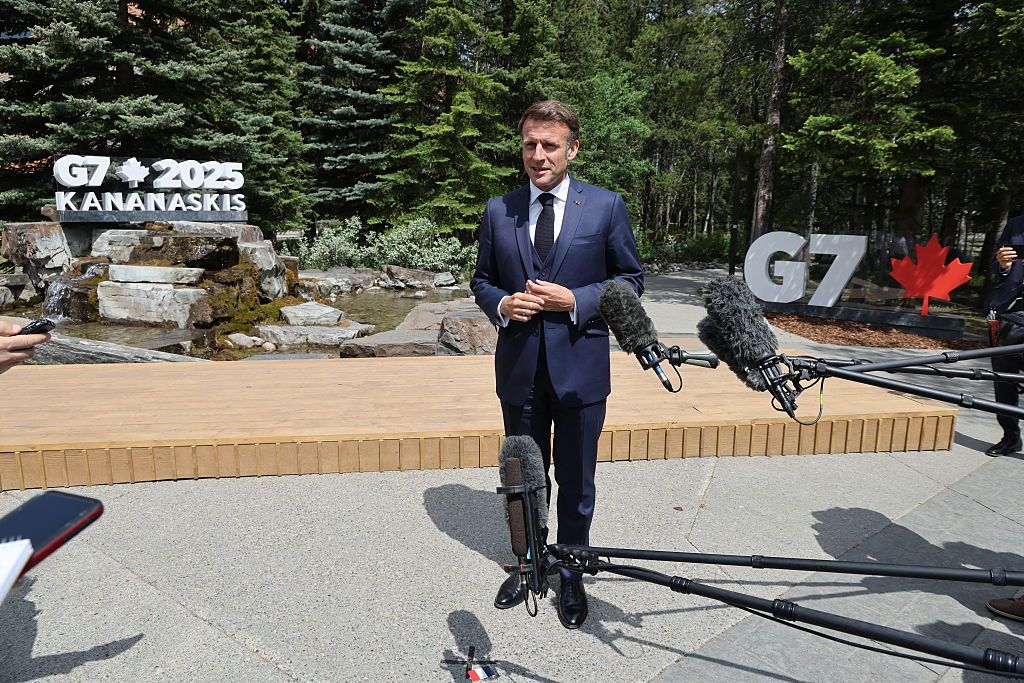

The European Union and its allies are ready to toughen sanctions on Russia, French President Emmanuel Macron said on the sidelines of the Group of Seven (G7) summit on June 17.
"With President (Volodymyr) Zelensky at the G7. We stand in solidarity with the Ukrainian people after last night’s massive Russian strikes," Macron said in a post to social media.
"We are determined to increase pressure on Russia to accept the immediate and unconditional ceasefire that Ukraine is ready for," he added.
Macron attended the G7 summit in Kananaskis, Canada, from June 15-17. Global leaders discussed a wide range of topics, including Russia's war against Ukraine.
As the G7 leaders met in Canada, Russia launched one of its worst drone and missile attacks on Kyiv since it began its full-scale war against Ukraine in February 2022, killing 16 people and injuring at least 134.
"The common position that is emerging is to say, 'We need to strengthen sanctions,'" CBC News reported, citing Macron.
Europe is proposing much tougher sanctions than the U.S. has imposed on Russia, Macron said, adding that the EU is in "very close co-ordination" with Canada, Japan, and the U.K.
Several countries, including Canada and the U.K., introduced additional sanctions on Russia as the G7 summit was ongoing.
Canada introduced a new military aid package for Ukraine in addition to its sanctions against Russia.
"In our view, this has changed the situation because it will allow us to bring Russia back to the negotiating table, as (U.S.) President (Donald) Trump has been demanding," Macron said, according to CBC News.
Zelensky attended the summit and met with various leaders, including Macron and Canadian Prime Minister Mark Carney.
Zelensky left the summit early, citing Russia's attack on Kyiv. The nearly nine-hour-long attack saw Moscow's forces launch large numbers of drones and missiles at Ukraine's capital.
Foreign Minister Andrii Sybiha condemned the attack, calling it a "massive and brutal strike" timed deliberately to coincide with the G7 summit.
Zelensky described the drone and missile assault as "one of the most horrifying attacks on Kyiv."
 The Kyiv IndependentKateryna Denisova
The Kyiv IndependentKateryna Denisova